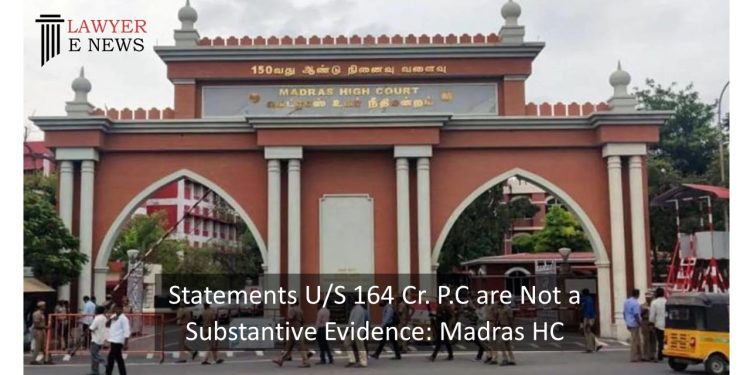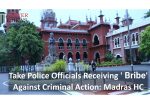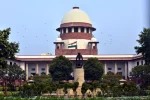Statements U/S 164 Cr. P.C are Not a Substantive Evidence: Madras HC

D.D: 22-07-2022
The Madras High Court recently vacated the conviction of a man accused of murder after observing that the trial court was misled in corroborating the statement of witnesses recorded under Section 164 of the Criminal Procedure Code with medical evidence when, in fact, all independent witnesses had become hostile.
Justices S Vaidyanathan and AD Jagdish Chandira noted the judicial precedents in which courts have clearly stated that statements recorded under Section 164 of the CrPC are not admissible as substantive evidence and can only be used to corroborate or contradict a witness’s statement.
In the present case, the appellant was alleged to have killed his twenty-year cohabitant by assaulting her. The appellant was allegedly already married and had three daughters. When he demanded that the deceased transfer her title to the house into the names of her daughters, she refused. It was alleged that the appellant doubted the behaviour of the decedent, engaged in frequent altercations with her, and beat her. The deceased filed a report with the police, and the matter was resolved. Later, the appellant attacked the victim with a log of wood, and she succumbed to her wounds. The trial court convicted the appellant under Sections 302 and 352 of the Indian Penal Code.
The appellant argued that the order of conviction was in violation of the law because the trial court failed to take into account the fact that all eyewitnesses had turned hostile and there was no admissible evidence against him to convict him. To convict the appellant, the trial court erred by relying on the witness statements recorded under section 164 of the Criminal Procedure Code. He argued that the law clearly stated that statements recorded under Section 164 Cr.P.C. can only be used to corroborate or contradict the testimony of witnesses vis-à-vis their courtroom statements, and cannot be used as substantive evidence. Thus, the trial court erred in ordering a conviction, particularly given that the prosecution did not take any measures to contradict the hostile witnesses.
Since the mahazar witnesses had turned hostile, it was also argued that the recovery of physical objects was implausible. In addition, the prosecution had not established the deceased’s ownership of the house, which was the alleged motive for the crime.
The respondent state, on the other hand, argued that hostile prosecution witnesses could not constitute a ground for acquittal. In addition, he argued that the prosecution witnesses gave a clear and convincing statement (under Section 164 of the Criminal Procedure Code) before the Judicial Magistrate, which is corroborated by the medical evidence.
After hearing both sides, the court reiterated the legal position that a statement recorded pursuant to Section 164 of the Code of Criminal Procedure is not substantive evidence and can be used to corroborate or contradict a witness’s statement. In RamKishan Singh v. Harmit Kaur and Others (1972) 3 SCC 280 and later in BaijNath Sah v. State of Bihar (2010) 6 SCC 736, the court upheld the same ruling.
The High Court noted that in the instant case, the trial court had concluded that even though the eyewitnesses had become hostile, their statements under Section 164 CrPC corroborate the medical evidence. The trial court, however, disregarded the fact that although the incident occurred on September 20, 2010, the statements were recorded on October 6, 2010. “The length of time it took to record the testimony of the witnesses speaks volumes.”
In accordance with Section 80 of the Indian Evidence Act of 1872, the trial court had adopted a presumption regarding the documents offered as evidence. However, in Sheo Raj v. State (1963) SCC OnLine All123), a three-judge bench made it clear that the presumption under Section 80 of the Evidence Act did not apply to the statements recorded by a Magistrate under Section 164 CrPC because they were not “evidence,” were not made in a “judicial proceeding,” and were not given under oath.
Even though the prosecution argued that bloodstains found on the appellant’s shirt belonged to the same blood group as the deceased, the court ruled in Sonvir @ Somvir vs. State of NCT of Delhi (2018) 8 SCC 24 that the mere matching of blood groups was insufficient to convict the accused.
In light of these factors, the court concluded that the prosecution had not proven its case beyond a reasonable doubt, and that it was therefore improper to convict the appellant/accused based on the evidence in the record. The trial court had erroneously concluded that there was corroboration between the statements of the witnesses recorded under Section 164 of the Criminal Procedure Code and the medical evidence. Having determined that it could not be upheld, the court vacated the trial court’s order of conviction and acquitted the appellant of all charges.
Siva
versus.
State by Inspector of Police






